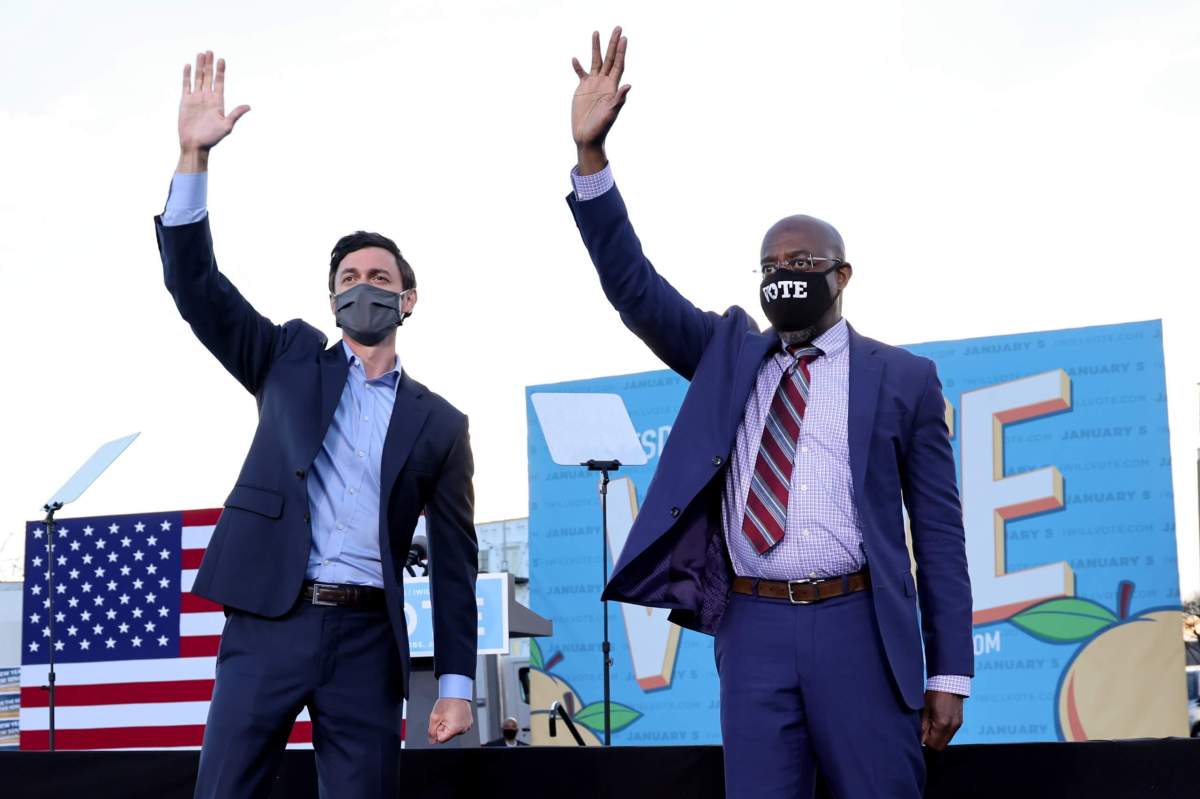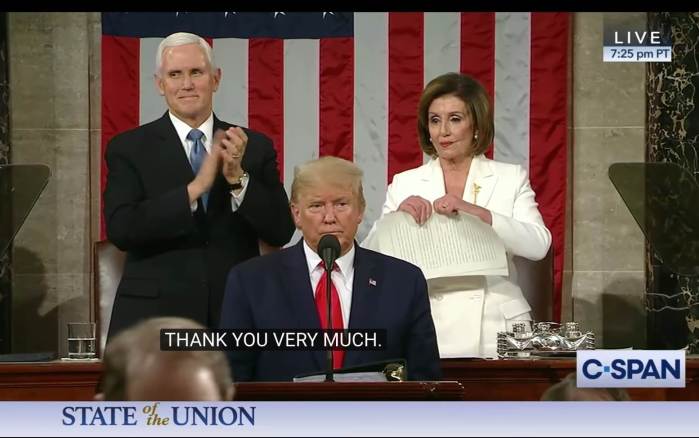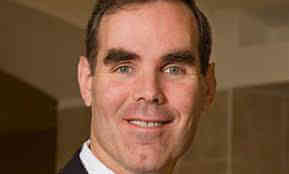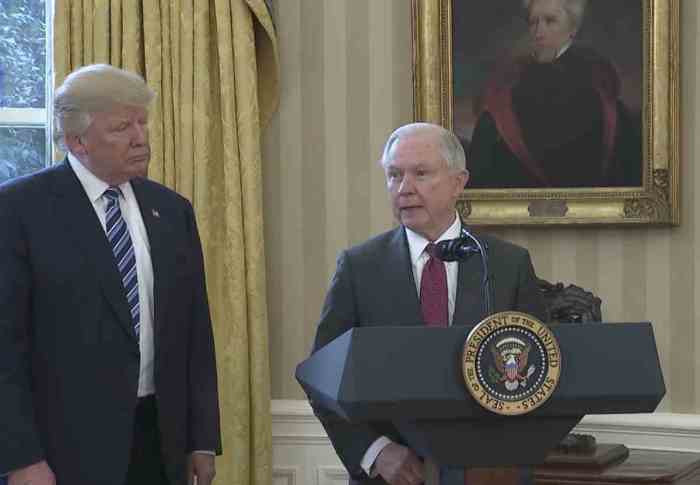Democrats recaptured control of the United States Senate after Raphael Warnock and Jon Ossoff pulled off critical victories over anti-LGBTQ Senators Kelly Loeffler and David Perdue in a pair of Senate runoffs.
The hotly contested races came just two weeks before President-Elect Joe Biden is inaugurated on January 20. The victories will provide the incoming administration and Democratic lawmakers a major boost in their bids to unravel the damage inflicted by President Donald Trump on marginalized communities including LGBTQ folks, people of color, women, and religious minorities, and others in the middle of a prolonged pandemic.
As of January 6, Ossoff led Perdue by roughly a half percentage point, while Warnock was roughly 1.5 points ahead of Loeffler.
Warnock will become the first Black US senator from Georgia and the 33-year-old Ossoff is poised to become the first Jewish US senator from the state and the youngest sitting lawmaker in the upper chamber. Those historic distinctions were made even more notable after Loeffler was caught running racist political ads that darkened Warnock’s skin and Perdue ran ads that distorted Ossoff’s face, drawing charges of anti-Semitism.
While Democrats are celebrating the gains on a broader level — and the ousting of Senate Majority Leader Mitch McConnell — they also managed to topple two specific lawmakers who would have undoubtedly obstructed progress time and again if they gained re-election.
Loeffler has become a major player in the emerging nationwide movement to ban transgender athletes from sports and, along with Perdue, has earned praise from anti-LGBTQ groups. Both lawmakers also cast votes confirming anti-LGBTQ Supreme Court Justice Amy Coney Barrett and opposed the Affordable Care Act, among other blemishes.

As the remaining votes were being counted, some LGBTQ groups and leaders celebrated the wins for Democrats on January 6.
“We hope that today’s outcome ushers in a new day when the legislative and executive branches can work together to make life easier, safer and more fair for people — whether it comes to access to healthcare, racial justice, or equality for LGBTQ people and everyone living with HIV,” Lambda Legal CEO Kevin Jennings said in a written statement. “If the past ten years have demonstrated anything, it is the importance of the Senate to determining whether the government will work for the people to advance equality and opportunity, or whether it will stand in the way of that progress.”
Alphonso David, president of the Human Rights Campaign, congratulated Ossoff and Warnock in a series of tweets on January 6, praising Warnock for running a campaign “committed to the dignity and equality of all Georgians” and commending Ossoff for running “a dynamic, inspiring campaign.”
Kierra Johnson, the incoming executive director of the National LGBTQ Task Force, said in a written statement that she is “thrilled that two Senate candidates who strongly support LGBTQ equality have carried the day.”
“The National LGBTQ Task Force pledges to work with Senators-elect Reverend Raphael Warnock and Jon Ossoff to pass the Equality Act as we continue to advocate for racial, economic, gender, reproductive justice and equity for all,” Johnson said.
However, even as Democrats recaptured control of the upper chamber, they could very well encounter roadblocks because they only have a razor-thin advantage — the Senate would be split 50/50 and Vice President-Elect Kamala Harris will be required to break ties — and the party will likely need every vote to advance important initiatives.
There are already some moderate Democratic lawmakers that could stand in the way of crucial, long-stalled legislation such as the Equality Act, which would build on the June Supreme Court decision — which established non-discrimination protections for LGBTQ individuals in employment — by amending Title VII of the 1964 Civil Rights Act to extend LGBTQ protections beyond employment to also include housing, public education, public accommodations, credit, federal funding, and the jury system.
West Virginia Senator Joe Manchin, a conservative Democrat, could be a major roadblock on that front. He has a record of opposing the Equality Act and standing against same-sex marriage, and in 2010 he was the only Senate Democrat to reject a provision to repeal the ban on queer service members.
Ossoff and Warnock, on the other hand, have explicitly supported the Equality Act, though they have also taken moderate stances on other issues, including healthcare. They do not support Medicare for All, but both have voiced a willingness to embrace the centrist approach of a public option.
Still, Ossoff and Warnock have vowed to work to advance other causes, such as raising the federal minimum wage, banning private prisons, and re-establishing voting rights, and Democrats are — for now — more hopeful about the next couple years.
“Georgia’s voters delivered a resounding message yesterday: They want action on the crises we face and they want it right now,” Biden said in a written statement on January 6. “On COVID-19, on economic relief, on climate, on racial justice, on voting rights, and so much more. They want us to move, but move together.”
He added, “It looks like we will emerge from yesterday’s election with Democratic leadership in the House and the Senate, and of course I’m pleased that we will be able to work with Speaker Pelosi and a Majority Leader Schumer. But I’m also just as determined today as I was yesterday to work with people in both parties — at the federal, state, and local levels — to get big things done for our nation. I have long said that the bipartisan COVID-19 relief bill passed in December was just a down payment. We need urgent action on what comes next, because the COVID-19 crisis hits red states ad blue states alike.”
To sign up for the Gay City News email newsletter, visit gaycitynews.com/newsletter.




































